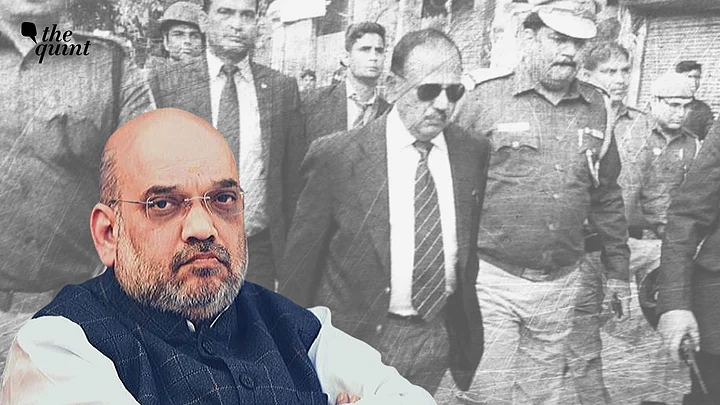Just what is the National Security Adviser Ajit Doval doing reprising his role as a police officer? Ajit Doval toured the riot-hit areas of Delhi on Tuesday night, 25 February, and Wednesday afternoon, 26 February, met police officers and provided them guidance in dealing with the situation, interacted with the local residents and provided them the reassurance that there will be no recurrence of what they had undergone in the past few days.
In the remarks reported by the media after his Tuesday night visit, Doval said that there were enough forces on the ground and there was no need to fear the situation. He acknowledged that the “capabilities and intentions” of the Delhi Police are being doubted by people and that this was an issue that needed to be addressed.
On Wednesday evening he was back in the localities offering words of reassurance to the shaken local communities, and staking his personal credibility on the continuance of peace.
This time, though, he made it a point to say that the home minister had made all the arrangements and the police were doing their job. Despite instances of the Delhi Police looking on as the mobs went on a rampage, the police have yet again been assigned to take charge by a man who had been a policeman a long time ago.
Bringing In Doval Shows Government’s Panic
Doval had begun his career as a police officer in the Kerala cadre, but soon opted to join the Intelligence Bureau where he spent most of his career and where he had a formidable record as an operations officer.
As NSA, Doval has a huge set of responsibilities ranging from advising the PM on National Security, to chairing the Executive Council of the Nuclear Command Authority, the Special Policy Group of the NSC, chairing the Defence Policy Group, as well as supervising the external intelligence agencies and being in-charge of relations with China as the PM’s Special Representative.
Having him check the policing arrangements of a some segments of riot-hit Delhi is clearly an add-on triggered by the government’s panic at the developments. This is also a mark of the lack of trust of the legal chain of command that spectacularly failed to do its job – the police commissioner, the lieutenant governor who is the nominal head of the administration, and the Union home minister who is in-charge of the police.
On Tuesday, as soon as he returned from Ahmedabad, Union Home Minister Amit Shah presided over several meetings to deal with the issue of the violence that had hit the capital city. But by evening, Doval had taken charge.
It’s one thing to be made responsible, and quite another to rush to the frontlines. Generals do not usually go to the battle front. Even though he had escort, he was after all going to a place where bullets had been flying the other day, wading into conversing with locals in situations where it is not easy to protect someone. But Doval, ever the operations man has not hesitated in front of danger as has been evident through his career.
But the question still needs to be asked of the government which had to rely on him for events which its own foolish policies have created.
When it Comes to Security, There’s No Detail Doval Won’t Track
Recall that Doval also had to pitch in on Kashmir. How much of a role Doval had in the government’s decision to take away Jammu & Kashmir’s statehood and derogate Article 370 is not clear. In any case the state’s status was not in his charter of duties. Yet, following the decision, he spent 11 days in the state to ensure that things went smoothly. In the process, he talked to locals, addressed J&K Police personnel and separately the CRPF and the army to keep up their morale.
Doval has been an unorthodox NSA, not hesitating to tread on toes and filling a vacuum when confronted with a situation. When it comes to security there is no detail that he will not track. Some years ago, there was a spectacular bank robbery in Gohana, Haryana, when robbers dug a 84-foot tunnel to break into the locker vault of a bank. According to a source, one of the queries seeking details of the modus operandi of the robbers came from Doval’s office.
Likewise, when in October 2014, a bomb blast took place in Burdwan, Doval personally landed up in Kolkata to discuss the matter with Chief Minister Mamata Banerjee and visit the site of the blasts for an inspection. He was clearly worried about the threat of the Jamiat-ul-Mujaihdeen Bangladesh (JMB) to West Bengal, which fortunately, did not materialise.
One may wonder that with his plate more than full, how Doval gets the time to do the fire-fighting for the government as well. The answer probably lies in his staff work.
Unlike previous NSAs who had one or two, Doval has as many as four principal aides looking at issues relating to intelligence, foreign affairs, crime-terrorism nexus and military affairs. There are also a slew of other advisers assisting him.
In addition, he has expanded the National Security Council apparatus to occupy the entire Sardar Patel Bhavan building where it used to earlier have about two or five floors worth of space. Further, the budget of the NSCS has also gone up sharply.
(The writer is a Distinguished Fellow, Observer Research Foundation, New Delhi. This is an opinion piece, and the views expressed are the author’s own. The Quint neither endorses nor is responsible for them.)
(At The Quint, we question everything. Play an active role in shaping our journalism by becoming a member today.)
